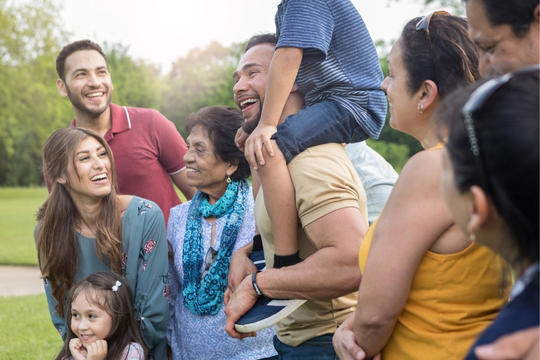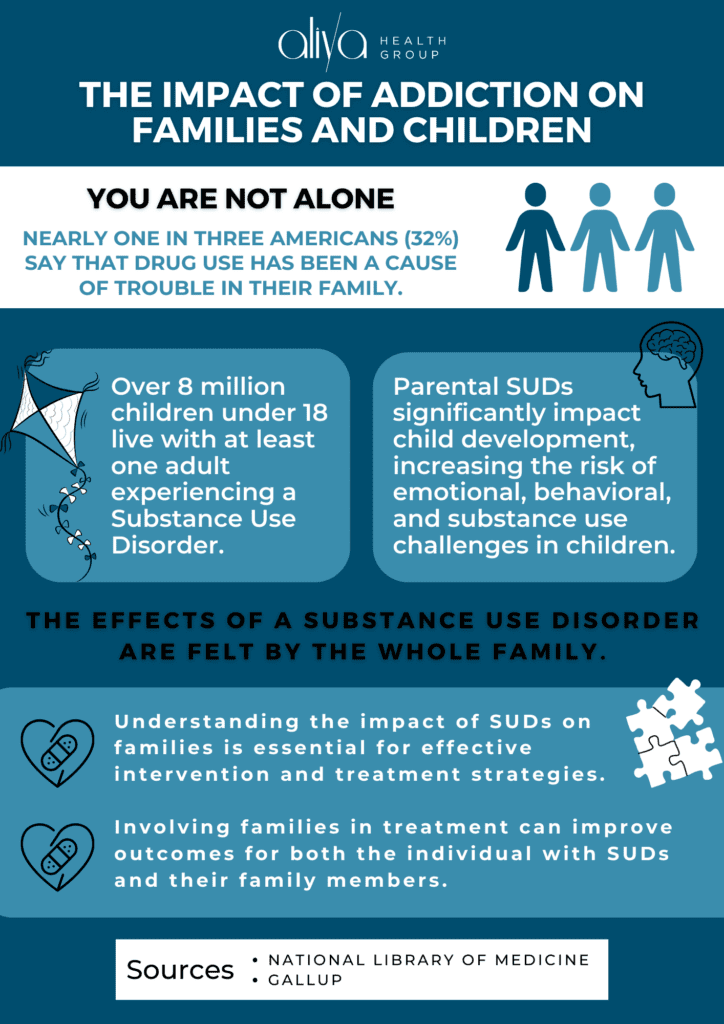Family resources for substance use and mental health disorders are imperative for recovery. When people struggle with their mental health or addiction, they often impact others in their life too. More often than not, addiction and mental illness damage a person’s physical, mental, emotional, financial, and social well-being.
However, it’s sometimes overlooked how damaging addiction is to those around them. Families often bear much of the strife that comes from an addiction. Poor mental health is a common side effect of substance abuse, which can impact how the whole family unit feels.
At Aliya Health Group, we know addiction affects everyone, especially families. It isn’t easy to see your loved one suffer, but you might not know how to contribute. We are here to help, which is why we provide resources for families.


The person struggling with an active addiction is not the only one impacted by their substance abuse. Since addiction is a complex disease, it can affect not only the individual, but their relationships as well. Those who love them sometimes go through equal amounts of pain watching their family member carry the weight of addiction. The individual feels the physical pains of withdrawal and cravings. They also become aware of the way their relationships, work life, and finances are crumbling.
As the individual struggles, so do the people who love them. Families witness the destruction their loved one is causing but can’t actively stop the process. As such, this is how addiction causes mental and emotional strife in families. Parents feel unable to help their child. Siblings watch their siblings become unfamiliar. Spouses and children watch their loved ones in pain. Realistically, all family members are affected by addiction.
Likewise, living with someone with mental health challenges is not always easy. Mental health is a spectrum that can fluctuate from season to season. However, severe mental health issues take a consistent toll on the individual and those around them. It can be challenging to know how to tackle your loved one’s poor mental health, because diagnoses and treatment plans vary widely. Oftentimes, there’s still a stigma around mental health challenges. Because of this, the person struggling may not want attention drawn to their pain. But the truth is mental health issues cause strain.
Realistically, living with someone with severe mental health problems sometimes feels like walking on eggshells. Due to the unpredictable nature of mental illness, family members never know what version of their loved one they’ll encounter. Also, it’s difficult to understand mental illness from the outside. Parents and spouses may witness their loved one escape into their pain, maybe missing work and falling behind on bills. Yet, it’s not as simple as encouraging them to just make a personal change. Nobody wants to sink into poor mental health. The only way to improve is to seek help. Mental health resources for families provide greater knowledge of what to do each step of the way.
Addiction and mental illness cast a shadow over families. When one family member struggles, everyone else feels that struggle. Living with someone who struggles with addiction or mental health issues can vary in severity, as each day has its ups and downs. Sometimes families are aware of the problem and actively involved, like when the individual is getting treatment. Much harder is when the family doesn’t know why their loved one is acting differently but sees something is wrong.
Unfortunately, addiction and mental health issues often results in secretive behavior, dissolving relationships, financial hardship, and a lack of trust. Whatever stage you’re in, rest assured there are family resources available to you. We know how difficult it is but hang in there, because your loved one can recover.
No one should have to wait to heal, which is why our specialists are available 24/7 to help guide you through the admissions process every step of the way.
Navigating the complexities of addiction and mental health issues within a family can be an overwhelming journey, filled with challenges and uncertainties. It’s essential to recognize that you’re not alone in this struggle. There are numerous family resources available aimed at providing support, guidance, and understanding to both individuals facing these difficulties and their loved ones.
Accessing the right information, advice, and assistance can be a beacon of hope, offering a pathway towards healing and recovery. By leveraging these resources, families can develop a stronger bond, learn coping mechanisms, and build a supportive environment conducive to overcoming the hurdles associated with addiction and mental health challenges.
All in all, mental illness and addiction often go together. One reason is that sometimes addiction leads to poor mental health, such as symptoms of depression or hallucinations. Also, individuals with mental health struggles may try to numb their pain with substances. The best approach for holistic recovery is a treatment plan that addresses one’s mental illness and addiction as a connected issue. Families never want to see their loved ones struggle. One way they can help is by encouraging their loved ones to seek treatment that addresses all of their issues.
Once your loved one is in treatment, you can release much of the stress of worrying about them. They’re unpacking the reasons behind their addiction, learning about themselves and their triggers, and preparing to cope in healthy ways. However, it’s still challenging as a family member when your loved one is working through recovery. We understand how difficult it can be to love someone with addiction and mental illness. In light of this, many support resources exist for families to help make the process feel better. Just as there are support groups and 12-step programs for those with addiction, families have the same available to them.
Some family recovery resources include:
These addiction resources for families are guides you can turn to at any time during your loved one’s recovery journey. Family support plays a pivotal role in addiction recovery, serving as a cornerstone for sustained healing and rehabilitation. The journey towards recovery from addiction can be a daunting and challenging one, often fraught with setbacks and obstacles. However, having a supportive family can provide a crucial source of encouragement, understanding, and motivation. Families can offer emotional support, lending a listening ear during times of struggle, and offering unwavering love and acceptance.
Your loved one may be experiencing mental illness on top of their addiction. The most impactful care they can receive looks at their co-occurring addiction and mental illness as connected issues. Holistic-focused treatment looks at the deeper reasons behind why the person abuses substances and helps them become better prepared to face everyday life. As the family of someone needing help, you may feel confused and out of control. You might struggle with the idea of releasing your loved one into the care of others. These are normal feelings that families of those with mental health issues often face. Fortunately, mental health resources for families can help you tackle these emotions and figure out how to lend your support.
Some helpful family mental health resources are:
Mental health resources for families are tools that bolster families in their resilience during difficult times with their loved ones. Mental health challenges can often feel isolating and overwhelming, but with the backing of family, individuals can find solace and strength. Families offer emotional support, creating a safe space where individuals can express themselves without fear of judgment.
Recovery from addiction and mental illness is not a journey that one walks alone. It’s a path that intertwines with the lives of families, friends, and communities. For families grappling with these challenges, hope and healing can emerge from collective understanding, support, and actionable strategies.
Education plays a pivotal role in recovery. Understanding the nature of addiction and mental illness demystifies these conditions, allowing families to cultivate empathy and patience. Knowledge empowers families to recognize symptoms, anticipate potential challenges, and effectively communicate with their loved ones and healthcare providers.
Open communication channels within the family are vital. Creating a safe space for conversations about feelings, progress, and setbacks encourages honesty and trust. Such an environment fosters mutual support among family members, allaying fears and building confidence in the recovery process.
Professional support cannot be understated. Engaging in family therapy provides a structured setting where members can address underlying issues contributing to addictive behaviors or mental health struggles. Therapists guide families in developing healthier relationships through improved communication skills, boundary setting, and conflict resolution techniques.
Participation in peer support groups also offers invaluable benefits in recovery. Connecting with others who are navigating similar experiences facilitates a sense of community and belonging. These groups provide practical advice, emotional solace, and motivational stories of resilience and recovery.
Self-care is crucial for all family members affected by addiction or mental illness. Balancing the demands of supporting a loved one while maintaining personal well-being can be challenging. Prioritizing physical health through regular exercise, balanced nutrition, adequate rest—and mental health through mindfulness practices—ensures that families have the strength to continue on their recovery journey together.
Overcoming addiction or mental illness within a family context requires dedication and hard work. By embracing the pillars of recovery together as a unit rather than separately as individuals—families can embark on a transformative journey towards healing that strengthens bonds and renews hope for a healthier future for all involved.


Along with the above resources, there are countless other places to find support in your situation. Conversations with others who have been in your shoes are invaluable, which is why many resources have a peer-led support group aspect. Other families usually have lots of knowledge and advice to share. In accordance, substance abuse and mental health professionals are excellent consultants. As such, professional treatment centers are another beneficial place to look for help and encouragement. Such recovery facilities understand the ins and outs of treatment, and they’re empathetic to the way family members are included in the journey.
At Aliya, we assist both individuals and families as they recover and get back on their feet. We would love to walk with you through the good and bad days of treatment. Reach out today — we’re here to heal, to teach, to empower, to amaze.
"*" indicates required fields
If your loved one is struggling with addiction or mental illness, it can be difficult and overwhelming when seeking out help. It is important to understand that these disorders are complex and often require professional help.
At Aliya Health Group, we understand the challenges of addiction and mental health disorders which is why we are here to provide support and guidance every step of the way. Our team of experienced therapists, counselors, and medical professionals dedicate their lives to providing compassionate, individualized care to each of our clients. We offer various programs and services to help individuals on their journey towards recovery.
If you and your loved one are ready to recover, there are many family resources and treatment services to help you begin to heal. To speak with one of our experienced admissions specialists, call 888-973-2078.
“I highly recommend this facility for anyone needing treatment. The staff isn’t just nice and genuine there but instead one big family. Whether it’s the owner, housing manager, or a bht you get the best down to earth genuine care. The material they teach in group is very helpful also.”
"*" indicates required fields
For Immediate Help Call: 888-973-2078
Aliya Health Group is a comprehensive network of addiction and mental health treatment centers, with locations spanning nationwide.
We are driven by our commitment to empower individuals, families, and the community by providing education, tools, and support, to help them lead healthy, fulfilling lives in recovery.
Our admissions team is available 24 hours a day, 7 days a week, 365 days a year.













